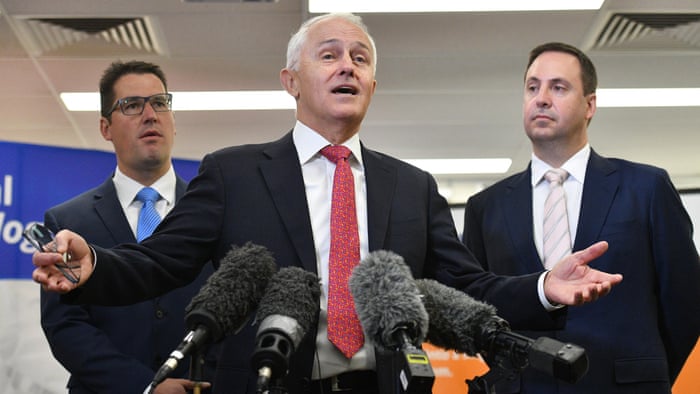 |
| Malcolm Turnbull on Australia's EU trade deal: |
The trade minister, Steve Ciobo, has said Australia would aim for a “high-quality, comprehensive free trade deal with the European Union in as quick a time as possible” but would not “sacrifice the quality of a trade deal for speed”.
At a press conference in Canberra on Wednesday Malcolm Turnbull announced that the EU had agreed to a mandate to negotiate a free trade agreement with Australia.
The prime minister said free trade was “key to my government’s plan” for economic growth and the EU deal would “create more jobs in Australia and it will create more jobs in Europe”.
“It is not a zero-sum game.”
Asked about European resistance to reducing agricultural barriers, including the French president Emanuel Macron’s assurances that French farmers would not be affected, Turnbull said Australia imported more agricultural products from Europe than it exported.
That fact “tells you a lot about how relatively little access Australian farmers have to Europe”, he said. “There is a huge amount of scope for more access to the European market.”
Turnbull praised Macron, saying that he and Germany’s chancellor, Angela Merkel, had pushed to allow EU negotiations with Australia to get under way.
Ciobo said Australia wanted to conclude the EU deal “as quick as we practicably can” but added: “I’ve always said I won’t sacrifice the quality of a trade deal for speed.”
“A good-quality trade deal with Europe will include enhanced agricultural access for Australian exporters.”
Ciobo said Australia exported $3.6bn of agricultural products to the EU and impored $4.9bn and that “had to change”. But he said agriculture was only “one aspect” of a trade deal.
In a statement Turnbull said the Coalition would also seek “better access for Australian services exporters; [to] expand two-way investment flows; and deliver a more seamless business environment”.
“We will explore rules and initiatives to support the digital economy and innovation, which are important for small and medium-sized enterprises.”
The European commission president, Jean-Claude Juncker, has vowed to complete the EU’s talks with Australia and New Zealand by 31 October 2019, when his time in office expires.
EU talks with Australia and New Zealand deal blow to UK free trade plans
Read more
The UK will not be able to start its negotiations over future trade with New Zealand and Australia until 30 March 2019.
Earlier, speaking to ABC’s AM, Ciobo insisted the talks would happen “in parallel” with free trade negotiations with the UK.
“That’s progressing, these things are happening in parallel. It’s not a case of it being black or white, it’s a case of doing both of these together.”
Turnbull trumpeted his government’s achievements on free trade, including a new deal with Peru and reviving the Trans-Pacific Partnership with 11 nations, despite the withdrawal of the US. He said Australia was also in “advanced negotiations with Indonesia”.
Given the combined GDP of US$1.7tn of the EU, a deal with the regional bloc would potentially be Australia’s largest free trade agreement.
Since you’re here …
… we have a small favour to ask. More people are reading the Guardian than ever but advertising revenues across the media are falling fast. And unlike many news organisations, we haven’t put up a paywall – we want to keep our journalism as open as we can. So you can see why we need to ask for your help. The Guardian’s independent, investigative journalism takes a lot of time, money and hard work to produce. But we do it because we believe our perspective matters – because it might well be your perspective, too.
I appreciate there not being a paywall: it is more democratic for the media to be available for all and not a commodity to be purchased by a few. I’m happy to make a contribution so others with less means still have access to information.
Thomasine, Sweden
Thank you to the many people who have already supported us financially – your contribution is what makes stories like you’ve just read possible. We increasingly need our readers to fund our work so that we can continue holding power to account and producing fearless journalism.
For as little as £1, you can support the Guardian – and it only takes a minute. Thank you.










No comments:
Post a Comment